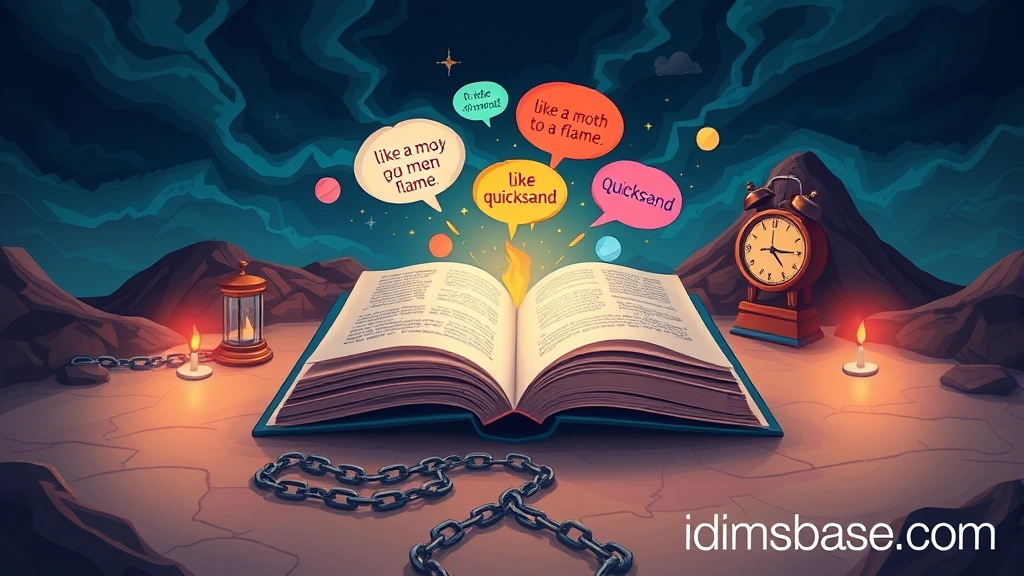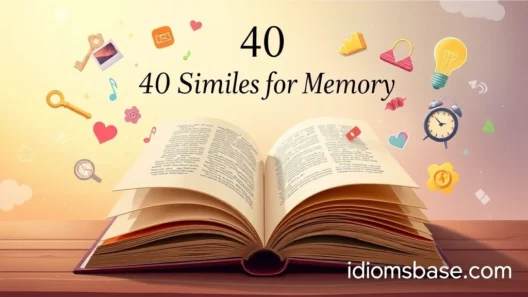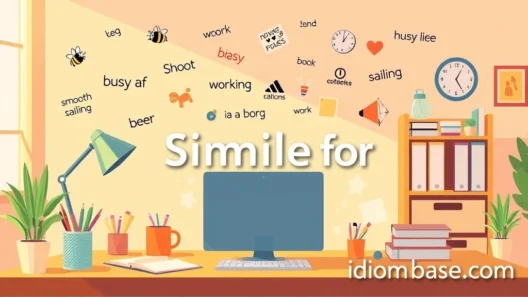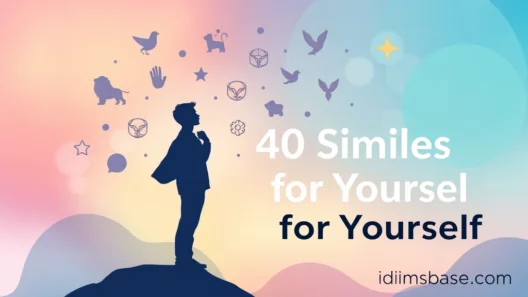Addiction. It's a word that carries a heavy weight, isn't it? It conjures images of struggle, loss, and an invisible chain that binds. But what exactly is it? How do you describe something so pervasive, so deeply ingrained, yet often so hidden? Sometimes, the best way to understand a complex idea is through comparison. That's where similes come in! They're like little linguistic bridges, connecting the abstract concept of addiction to something more tangible, something we can visualize and feel.
We're going to explore 40 powerful similes that paint a vivid picture of what addiction can feel like, both for the person experiencing it and for those who witness its grip. You'll find that these comparisons offer a unique lens through which to view this challenging topic, helping us to grasp its many facets.
Unpacking the Grip: 40 Similes for Addiction
Let's dive into these comparisons, each one offering a fresh perspective on the nature of addiction. You might find some resonate deeply with your own experiences or observations.
Addiction as a Physical Force
- Like quicksand: The more you struggle, the deeper you sink. It pulls you down, slowly but surely, until escape seems impossible.
- Like a boa constrictor: It wraps around you, slowly tightening its grip, squeezing the life out of everything else.
- Like a relentless tide: It pulls you out to sea, further and further from shore, no matter how hard you try to swim back.
- Like a heavy anchor: It weighs you down, preventing you from moving forward, keeping you stuck in one place.
- Like a slow poison: It seeps into your system, gradually eroding your health, your mind, and your spirit.
- Like a parasitic vine: It latches onto you, drawing nourishment and strength, choking out your own growth.
- Like a runaway train: Once it starts, it's incredibly hard to stop, picking up speed and momentum.
- Like a black hole: It sucks everything into its vortex – your time, your money, your relationships, your very essence.
- Like a persistent shadow: It follows you everywhere, a constant presence that you can't shake off.
- Like a chain around your ankle: It limits your freedom, restricting your movements and choices.
Addiction as a Mental or Emotional State
- Like a broken record: It plays the same destructive thoughts and urges over and over in your mind.
- Like a siren's song: It lures you in with promises of pleasure or relief, leading you towards danger.
- Like a fog: It clouds your judgment, making it difficult to see clearly or make rational decisions.
- Like a mirage: It promises fulfillment and happiness, but delivers only emptiness and illusion.
- Like a constant itch: It creates an unbearable craving that demands to be scratched, even if it causes harm.
- Like a whisper in your ear: It constantly tempts and persuades you, even when you know better.
- Like a tormenting ghost: It haunts your thoughts, a relentless presence that you can't escape.
- Like a deceptive friend: It seems to offer comfort or escape, but ultimately betrays you.
- Like a tangled web: It traps you in a complex network of behaviors and consequences.
- Like a heavy cloak of shame: It covers you, making you want to hide from the world.

Addiction as a Lifestyle or Relationship
- Like a demanding master: It dictates your actions, thoughts, and priorities, leaving you little control.
- Like a destructive dance partner: It leads you down a path of self-sabotage, even when you try to resist.
- Like a secret lover: It demands your time and attention, often at the expense of other relationships.
- Like a never-ending quest: You're always chasing the next high, the next fix, but true satisfaction remains elusive.
- Like a prison without walls: You're confined by your cravings and habits, even if you appear free.
- Like a house built on sand: It offers no stable foundation, prone to collapse at any moment.
- Like a game of Russian roulette: You're taking dangerous risks, gambling with your life and future.
- Like a bottomless pit: No matter how much you put in, it's never enough; the craving remains.
- Like a self-inflicted wound: You are causing harm to yourself, often knowingly, yet feel compelled to continue.
- Like a powerful cult: It demands absolute loyalty and obedience, isolating you from outside influences.
Addiction as a Process of Change
- Like a slow burn: It starts subtly, then intensifies over time, consuming everything in its path.
- Like a river carving a canyon: It gradually erodes your strength and resilience, deepening its impact.
- Like a snowball rolling downhill: It starts small, but gains size and momentum, becoming harder to stop.
- Like rust on metal: It slowly corrodes your life, weakening its structure and integrity.
- Like a genetic inheritance: It feels deeply ingrained, almost a part of your very being.
- Like a second skin: It becomes so integrated into your identity that it's hard to imagine life without it.
- Like a habit you can't break: It's a deeply ingrained pattern that feels impossible to alter.
- Like a journey into darkness: You're moving further and further away from the light, losing your way.
- Like a fading memory of who you were: It slowly erases your former self, leaving only the addicted persona.
- Like a broken compass: It guides you in the wrong direction, leading you astray from your true path.
Key Takeaways
Understanding addiction through similes helps us grasp its multifaceted nature. It's not just one thing; it's a complex interplay of physical, mental, emotional, and social factors. These comparisons highlight:
- The feeling of being trapped: Many similes emphasize the loss of control and the inability to escape.
- The deceptive nature: Addiction often promises relief or pleasure but delivers pain and emptiness.
- The gradual progression: It often starts subtly and intensifies over time, becoming more deeply ingrained.
- The destructive impact: It erodes health, relationships, and overall well-being.
By using these vivid descriptions, we can talk about addiction in a more empathetic and understandable way, fostering greater awareness and reducing stigma.

Frequently Asked Questions
Q1: Why are similes useful for describing addiction?
A1: Similes are incredibly useful because they take an abstract and often difficult concept like addiction and compare it to something more concrete and relatable. This helps people to visualize and better understand the complex feelings and experiences associated with addiction, making it more accessible and less intimidating to discuss.
Q2: How can these similes help someone struggling with addiction?
A2: For someone struggling with addiction, these similes can provide a way to articulate their experience. Sometimes, finding the right words to describe what you're going through can be challenging. These comparisons can offer a vocabulary to express the feeling of being trapped, controlled, or eroded by addiction, which can be a crucial first step toward seeking help and understanding.
Q3: Can these similes help family and friends understand addiction better?
A3: Absolutely! Similes can be powerful tools for empathy. When family and friends read or hear these comparisons, they might gain a deeper insight into the internal struggle of their loved one. For instance, understanding addiction "like a boa constrictor" or "a heavy anchor" can help them see that the person isn't simply choosing to behave a certain way, but is truly battling a powerful force.
Q4: Are there common themes across these 40 similes?
A4: Yes, there are several recurring themes. Many similes emphasize the feeling of being trapped or powerless ("quicksand," "chain around your ankle," "prison without walls"). Others highlight the deceptive and destructive nature of addiction ("siren's song," "slow poison," "deceptive friend"). The idea of gradual erosion or consumption is also common ("parasitic vine," "rust on metal," "black hole").
Q5: How can I use these similes in conversation about addiction?
A5: You can use these similes to initiate more empathetic and descriptive conversations. Instead of just saying "addiction is bad," you could say, "It sounds like addiction is acting like a runaway train in your life, picking up speed and feeling impossible to stop." This opens the door for deeper discussion and shared understanding, making it easier to connect with others on the topic.







